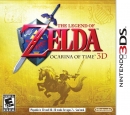| GhaudePhaede010 said:
... ... ... ... You pretty much avoided everything I said... or worse, you acknowledged it passively then tried to stress your, "point" Funny not found. Ahhh, forget it, why am I arguing with someone that does not see Wii as a current gen console? |
I wasn't trying to be funny, that's just me being an a-hole (i am an a-hole).
For the record, I acknowledged it actively, but tried to make it clear that it was besides the point. I must have failed.
Mr Khan said:
Often it feels like we're speaking different languages, only partially comprehending one another |
I understand. If the gens were based on a specific business era (say the industry as a whole), then it makes sense, but what happens when a console overlaps two industry peaks, what gen is it? That's why I liked your example, because it showcased a lacking in the term. That's why I called it a case in point.
Flanneryaug said:
So, if the Wii U was 10 times as powerful as the 720 or PS4 would that make it a 9th generation console? No, it would still be an eigth generation console, because it would be coming out in the eigth generation. |
Best counter-argument this far. I have no answer other than the term generation is flawed, as it's relative to context. If it's a Nintendo gen, then it makes sense. But if it's within the norms of the industry, then the WiiU is 9 gens early. Makes sense?
Mnementh said:
If computer technology sees an end to Moores Law, we will see no new generation following your definition. Only one new current-gen console after the other. Also talking about hardware-limitations - obviously the following machines were also restricted in hardware, because they are followed by another. Not the limitations are the reason for a new gen. Only because technology evolved, the machine is able for more. If your theory would be true, and the new gen is needed because game-creators are restricted by specs - why do we see at the start of a gen the same games? Only after some time we see evolved games that are able to do more with the hardware. That looks more like the game-creators adapt to the new possibilities of the hardware, instead the hardware adapts to the needs of the game-creators. |
If I'm not mistaken, those are called 1st, 2nd and 3rd generation games on a same platform. I could be wrong. So it kind of proves the point that with progress comes the definition of a generation within a context.
RolStoppable said:
Why again do you believe that the DS and PSP were not in the same generation and why do you think that the 3DS is not a current generation handheld? On topic: Not much to say here. Incontinent gaming journalism. |
If I answer this, I get no reply, so to keep your attention, I'm not gonna answer :P
Just kidding. So, I think the DS and PSP were a gen apart, technically speaking. The PSP leap-frogged a technical gen, that of the N64. I'm using the term technical gen because the normal use of the term gen fails. Regularly, the two competitors in a gen battle at largely similar levels, due to different approaches to solving the same problem: the need to be technically relevant. That's the reason gens exist. The PSP, using an aggressive push for graphical advancements, went a step ahead of the DS, and as such stressed the usual dynamics of console competition as could be seen in history. The same was done with the PS3. At the same time, both the DS and the Wii were employing low-end disruption strategies, so as such they didn't push the boundaries of hardware enhancement. Therefore they were somewhat of a step behind.
I could be wrong, but there must be more to gens than what has been studied this far, and the world of video gaming is still so young. The terms are still either loose or flawed, we have the same problem with the concept of casual and core. Terms that fail to express ideas we have of concepts we observe in the industry. It gets pretty philosophical when we get to that level.


























































